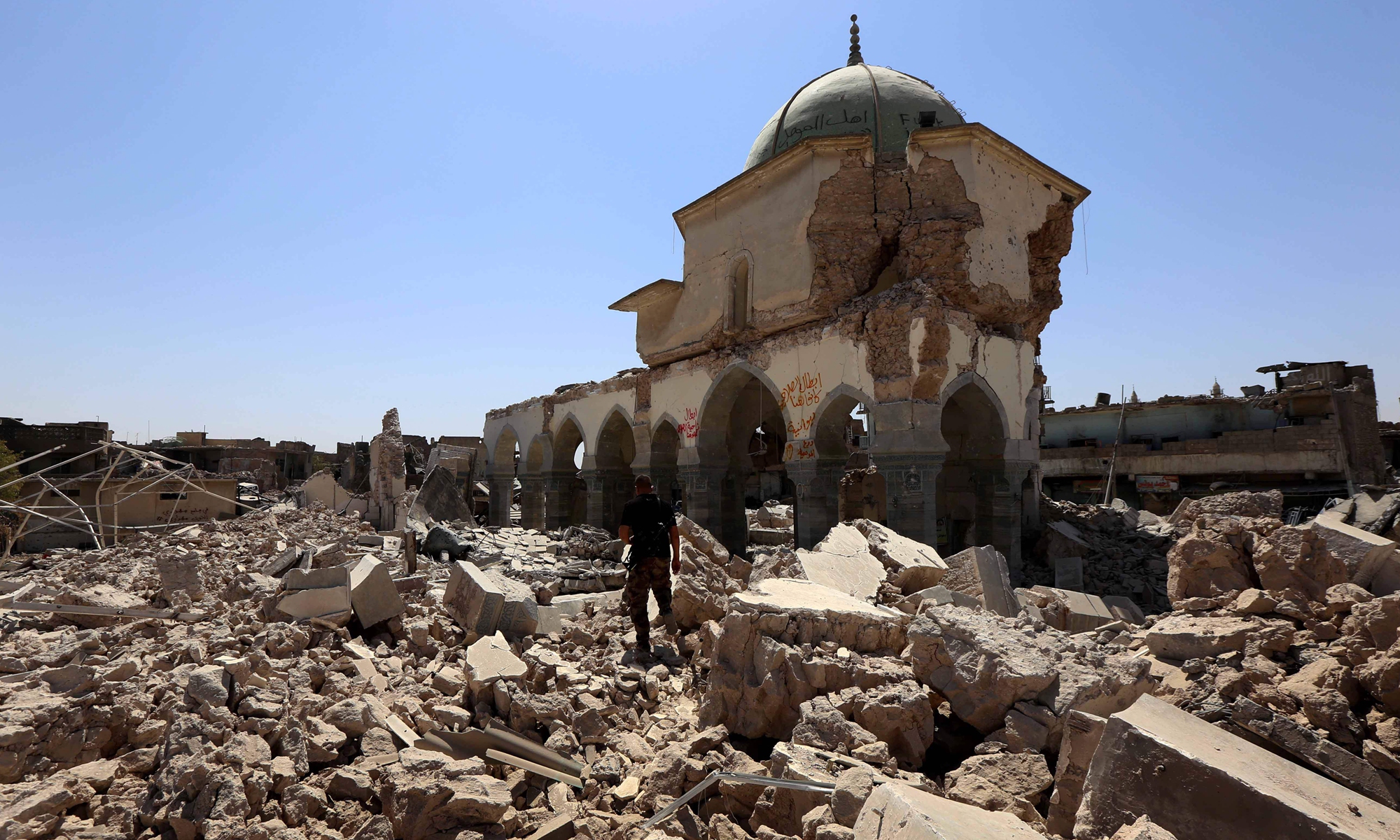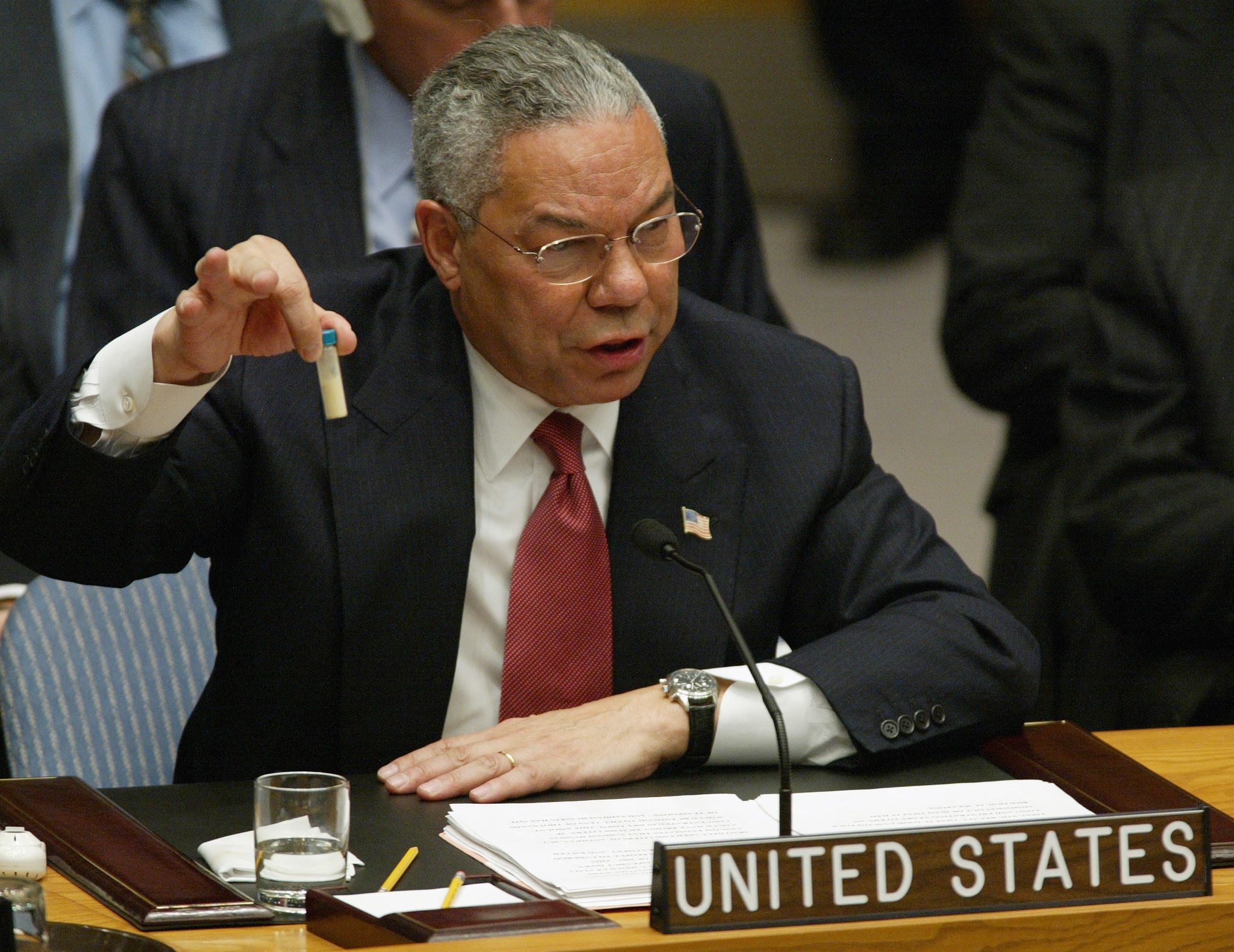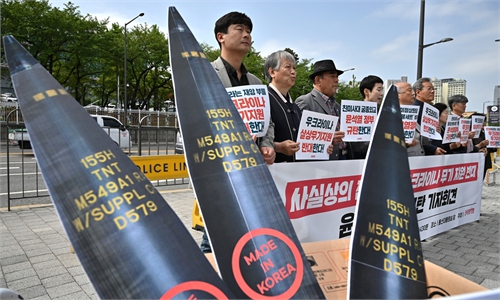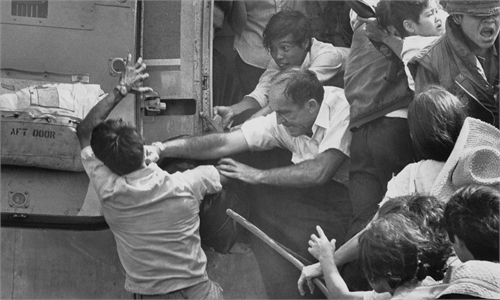IN-DEPTH / IN-DEPTH
What US left behind in Iraq – division, terrorism threat and lingering impacts of depleted uranium bombs
Messy war

A member of Iraq's Counter-Terrorism Service (CTS) walks past part of the destroyed Al-Nuri Mosque in Mosul's old city on July 30, 2017. Photo: VCG
Editor's note: On March 20, 2003, the US-led invasion of Iraq, formally known as "Operation Iraqi Freedom," was given the green light on the assertion that Iraq's then-leader, Saddam Hussein, was harboring weapons of mass destruction (WMDs) and was a threat to global security. Ironically, although the war was termed by the US as "Operation Iraqi Freedom," in reality, "Iraqi Freedom" did not bring actual freedom to the people of Iraq, but instead, posed great threats to their rights to development, health and survival. Until December 18, 2011, the US military finally withdrew from Iraq, but the damage caused by the war continues to persist to this day.
Upon the withdrawal of the US military, Iraq fell into an economic predicament. During the war, air raids by the US military caused more than half of Iraq's oil wells to catch fire. Coupled with various sanctions, Iraq's oil-related industries suffered heavy losses.
Meanwhile, the war resulted in serious electricity and water shortages in the country. Some media outlets reported that when the US military withdrew from Iraq, the country had "regressed to a pre-industrial state." Among young people in Iraq, there was a pervasive sense of despair.
After the US military's withdrawal, Iraq's politics also fell into disarray. Under the auspices of the US, Iraq began implementing a political quota system in 2002 which meant distributing political power and national resources to the three main religious and ethnic groups: Shiites, Sunnis, and Kurds.
However, this seemingly democratic system led to political sectarianism and a series of corruption problems. After the Americans left, local power struggles resulted in further division and chaos in Iraq. According to reports, just a few days after the US military's withdrawal on December 23, 2011, factional strife led to 15 serial bombings in Baghdad, the capital of Iraq, in one day, resulting in more than 200 casualties.
'Hotbed' of terrorism
The war instigated by the US in Iraq, while causing local economic collapse and political divisions, also led to a more severe terrorist threat.
According to a research report from Brown University in the US, the war initiated by the US invasion of Iraq resulted in at least 300,000 civilian deaths, a substantial portion of which were due to sectarian killings in the region.
The struggle between different factions, coupled with the killings caused by the war and perennial sectarian conflicts, led to more terrorist attacks and provided for a hotbed for the existence and development of more terrorist organizations.
Some analysts suggest that it was the war initiated by the US that escalated the deep-seated contradictions between sects, making them difficult to resolve. On the other hand, the invasion by the US and the withdrawal of the US military objectively provided for a continuous supply of "human resources" for terrorist organizations and acts of terror.
In interviews with local media outlets, residents have claimed that, for young people who did not escape from Iraq, many only have two paths to choose from - working for the government or joining an armed group.
The US has also been a mass supplier of weapons to rising terrorist sects. A 2016 New York Times report stated that between 2003 and 2014 alone, an estimated hundreds of thousands of firearms and other weapons were shipped from the US to Iraq, of which a sizable quantity fell into the hands of numerous armed groups.
Even after the retreat of US forces, people in Iraq could still purchase a variety of weapons online, most of which came from the US. The report concluded that tens of billions of dollars in American-made weapons have flowed into countries plagued with violence and terrorism. But, following the US precedent, the solution to such widespread weapon proliferation has been to introduce more weapons.
Originally, the reason for the US' invasion of Iraq was to search for so-called WMDs with the aim of "counter-terrorism," to "defend the world from severe danger." However, the result of the war has since made Iraq and the rest of the region poorer and more dangerous. The US military quickly overthrew the Saddam regime in the war, opening a "Pandora's box."
The war not only plunged Iraq and the Middle East into long-term turmoil, but also led to the rampant spread of terrorism, which continues to extend its reach.
Some media sources have commented that in the Middle East including Iraq, America's war on terror is leading to more terror. At the same time, reports from American think tanks suggest that the US military's approach is that once military intervention starts, it never ends. It's reported that till now, thousands of American armed personnel remain in Iraq to protect US interests.

Former US secretary of state Colin Powell holds up a vial of what was later found to be washing powder as evidence of "weapons of mass destruction" being developed in Iraq on February 5, 2003. Photo: AFP
Maltreatment of prisoners
The Iraq War launched by the US under the excuses of "counter-terrorism" and "non-proliferation" has brought immeasurable trauma to the Iraqi people. Hundreds of thousands of Iraqi civilians were killed or injured in the war with women and children suffering the brunt of the war, while displacing millions of others, turning them into refugees, which has also imposed a heavy burden on neighboring countries.
Moreover, incidents of prisoner torture by the US military exposed, such as the appalling cases in Abu Ghraib in Iraq.
A report from CNN in March 2023, stated that what followed after the US' invasion and occupation of Iraq was not peace, but civil war, overwhelming the country with division and violent conflict. The US military is known to have detained at least 20,000 Iraqi prisoners since the "official" end of the invasion. The report mentioned an Iraqi named Nsaif, who was imprisoned by the US military in the notorious Abu Ghraib prison in 2003. Although he and his family have tried to move on from the hellish ordeal of his detention, the horrors of war still haunted him. Nsaif said in an interview that after his release "it took a long time to stop having nightmares."
According to media reports, in prisons controlled by the US military, being stripped naked, robbed of food, threatened by dogs, and held in solitary confinement are all common practice against prisoners. In 2004, after the abuse of prisoners in the Abu Ghraib prison was exposed, many people were shocked to find that the US military still abused prisoners and sexually assaulted them.
After the withdrawal of the US military, some Iraqis who had been abused in the black prisons manned by the US military came forward to expose their captors and denounce the inhuman treatment they endured. Ahmed was among them. He was arrested without cause by the US military on his way to register at a university in 2003. He was then thrown into a black prison by the US military and was detained for two and a half years before being released. Ahmed recalled that the prison was hell on earth. The US military shackled his ankles with iron chains, tied his hands behind his back, and hung him upside down to torture him. The guards also forced prisoners to take off their clothes and shocked their private parts with electric currents, according to media reports.
The reports revealed that for many prisoners who have been abused by the US military, although some physical wounds may heal over time, the psychological damage caused by the war will remain for a long time.
Depleted uranium bombs
After the war in Iraq, the US not only failed to find the "weapons of mass destruction" upon which the entire war was predicated, but left Iraq with hundreds of tons of depleted uranium bombs and toxic waste, as well as countless bombs and landmines. The depleted uranium bombs used by the US military in Iraq have also caused long-lasting harm to the Iraqi people.
While the US government has admitted to the use of depleted uranium bombs in the Iraq war, it insisted that these bombs have "no health impact." However, the dangers posed by depleted uranium bombs are gradually becoming apparent in Iraq.
According to media reports, after the Gulf War, the radiation intensity in Basra and other places in southern Iraq suddenly increased, and the number of patients with spontaneously occurring diseases, especially those of the blood and various forms of cancer, increased greatly. The cancer death rate in Iraq after the war rose to 10 times of that before the war, with the most affected being children.
The US itself also tasted the bitterness of using depleted uranium bombs. The multinational troops participating in the war, especially US military veterans, began to suffer from "Gulf War Syndrome."
The "Gulf War Syndrome" is, to a certain extent, caused by the effects of depleted uranium bombs, characterized by physical decline, irritability, headaches, muscle and joint pain, and sleep disorders.
In an investigation to find out more about the "Gulf War Syndrome," it was discovered that among the 21 US armored tanks and transport vehicles accidentally struck by depleted uranium bombs, 113 soldiers were contaminated by depleted uranium. The uranium content in the bodies of 22 soldiers was 5 times higher than normal.
Iraqi officials have noted that depleted uranium bombs have had a direct and serious impact on the health of the Iraqi people and have also caused serious pollution to the environment.
They have also looked into the effects of the bombs on children under the age of five in southern Iraq who were hardest hit. Many children died of malignant tumors. Some medical experts believe that this is because some affected Iraqi mothers suffer from the sequelae of depleted uranium bombs, causing numerous babies to be born with congenital blood cancer or other diseases.
Birth defects in Iraqi children after the war have caused immeasurable pain and imposed a financial burden onto countless Iraqi families. In the war-torn Iraqi city of Fallujah, doctors there continue to witness the births of children with severe birth defects so that many families fear conceiving. Another 2010 study also showed an 86-fold increase in childhood cancer rates in Fallujah since the 2004 attacks.
Some military experts said that the radiation level in southern Iraq, which was bombed using depleted uranium bombs, was 10 times than that of other areas. The radioactive pollution caused by the large amount of depleted uranium ammunition launched into Iraq has also polluted local food and drinking water.
The main component of depleted uranium bombs is uranium oxide, and its toxicity mainly comes from the radioactive elements it contains, which can cause human tissue damage and gene mutations. Exposure to very small amounts of depleted uranium can cause serious consequences such as cancer, fetal abnormalities, and brain disease.
Moreover, the use of depleted uranium bombs can cause serious damage to the environment. It will not only pollute the soil and water, but also release a large number of harmful gases, causing a long-term irreversible impact on the ecological environment. Because of this, the US military has formulated a set of strict protective measures for the storage and launch of depleted uranium bombs, and stipulated that protection should be implemented when touching such weapons. The US military has never conducted test firing experiments on depleted uranium bombs in its territory.


